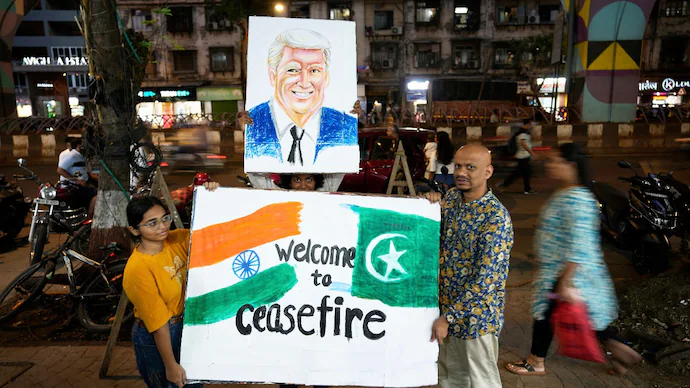Mubashar Nadeem
The recent ceasefire between India and Pakistan, though fragile, presents a temporary moment of relief. However, beneath this calm, there are pressing challenges that Pakistan must face head-on. Indian Prime Minister Narendra Modi, under the influence of the RSS (Rashtriya Swayamsevak Sangh), the ideological backbone of the ruling BJP, is likely to escalate tensions in the near future. Even if open conflict is avoided, the ultra-right regime and its biased media continue to distort facts and spread false narratives about Pakistan. With this in mind, it is crucial to adopt a long-term perspective in order to secure Pakistan’s future.
The underlying tension between the two nuclear-armed nations is unlikely to dissipate anytime soon. For Pakistan, this means that restoring its credibility on the global stage requires distancing itself from extremist elements and committing to essential reforms—most notably, economic reforms. While India’s internal issues under Modi’s government may create an opportunity, Pakistan must be strategic and act quickly.
The gap between the two countries is narrowing, yet Pakistan must seize the moment. However, that can only happen through achieving economic independence and strengthening the rule of law within its borders. One of the key reasons India continues to pressure Pakistan, despite being in the wrong, is the internal weaknesses that have plagued Pakistan for decades. The country’s economy has struggled for over thirty years, marked by repeated external debt restructurings and recent brushes with financial default. This cycle of instability has reduced foreign policy to simply seeking bailouts from international organizations and friendly nations, eroding Pakistan’s dignity and international standing.
Domestically, the political instability in Pakistan continues to worsen. The undermining of the public mandate in the 2024 elections has exacerbated this instability, becoming one of the primary reasons for the ongoing political and economic challenges. This internal weakness was recognized by India, which, in its usual aggressive fashion, attempted to capitalize on Pakistan’s vulnerabilities, both internally and externally. However, India’s miscalculation in this instance has resulted in a temporary setback for them. The people of Pakistan, despite their internal divisions, have always rallied behind the armed forces when it comes to defending the country’s sovereignty and territorial integrity.
Internationally, Pakistan has been fortunate to receive support from China, reaffirming its status as a strategic ally. Meanwhile, India has been pushed back, not just diplomatically, but in terms of regional influence as well. This has been a blessing for Pakistan, but it must not rely on luck for its long-term security. The nation must prepare for future threats by bolstering its internal resilience and initiating meaningful reforms.
Economic self-reliance is critical to strengthening Pakistan’s position on the global stage. To achieve this, the country needs stability, inclusivity, and the willingness to adopt austerity measures. These are the building blocks of national self-sufficiency. The government must focus on policies that address the grievances of all provinces, ensuring that no region is left behind. Economic inequality must be reduced, and the tax burden must be distributed more fairly. To set the right example, the government should start by cutting unnecessary expenditures, including reducing high salaries and minimizing the size of the government.
Pakistan’s economy cannot continue on its current path. The government and the State Bank of Pakistan must adopt long-term investment strategies while addressing the country’s political and taxation challenges. This approach is vital, as Pakistan cannot afford another war—its fragile economy would be unable to withstand the additional strain. Rebuilding foreign exchange reserves, attracting foreign investment, and creating a sustainable economic environment are essential steps to prevent the country from further economic collapse.
This recent escalation between India and Pakistan serves as a wake-up call. It is a critical moment for Pakistan to recognize that this may be the last opportunity to implement serious reforms and put the country on a path toward stability and prosperity. The nation must not squander this chance. The support of international players like the United States and good fortune may have temporarily eased the pressure on Pakistan, but the country must work to build a sustainable future. This means making tough decisions now in order to ensure that Pakistan can defend itself against future threats without relying on external factors.
In conclusion, while the current ceasefire offers a brief respite, Pakistan must focus on its long-term strategy for security, which lies in economic independence, political stability, and national unity. The nation cannot afford to ignore the structural weaknesses that have hindered its progress for so long. By implementing meaningful reforms, both economically and politically, Pakistan can restore its dignity, strengthen its defenses, and earn the respect it deserves on the global stage. The time to act is now, before the window of opportunity closes.
















